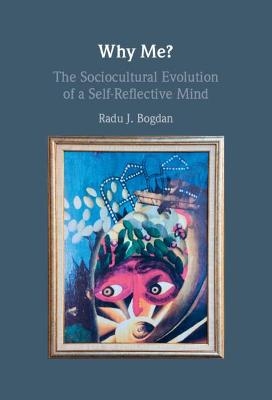
Why Me?
The Sociocultural Evolution of a Self-Reflective Mind
Seiten
2021
Cambridge University Press (Verlag)
978-1-316-51818-2 (ISBN)
Cambridge University Press (Verlag)
978-1-316-51818-2 (ISBN)
This book explores the evolution of the mental competence for self-reflection: why it evolved, under what selection pressures, in what environments, out of what precursors, and with what mental resources. It will interest scholars across the fields of cognitive science, developmental psychology, evolutionary psychology, and philosophy of the mind.
This book explores the evolution of the mental competence for self-reflection: why it evolved, under what selection pressures, in what environments, out of what precursors, and with what mental resources. Integrating evolutionary, psychological, and philosophical perspectives, Radu J. Bogdan argues that the competence for self-reflection, uniquely human and initially autobiographical, evolved under strong and persistent sociocultural and political (collaborative and competitive) pressures on the developing minds of older children and later adults. Self-reflection originated in a basic propensity of the human brain to rehearse anticipatively mental states, speech acts, actions, and states of the world in order to service one's elaborate goal policies. These goal policies integrate offline representations of one's own mental states and actions and those of others in order to handle the challenges of a complex and dynamic sociopolitical and sociocultural life, calling for an adaptive intramental self-regulation: that intramental adaptation is self-reflection.
This book explores the evolution of the mental competence for self-reflection: why it evolved, under what selection pressures, in what environments, out of what precursors, and with what mental resources. Integrating evolutionary, psychological, and philosophical perspectives, Radu J. Bogdan argues that the competence for self-reflection, uniquely human and initially autobiographical, evolved under strong and persistent sociocultural and political (collaborative and competitive) pressures on the developing minds of older children and later adults. Self-reflection originated in a basic propensity of the human brain to rehearse anticipatively mental states, speech acts, actions, and states of the world in order to service one's elaborate goal policies. These goal policies integrate offline representations of one's own mental states and actions and those of others in order to handle the challenges of a complex and dynamic sociopolitical and sociocultural life, calling for an adaptive intramental self-regulation: that intramental adaptation is self-reflection.
Radu J. Bogdan is Professor Emeritus of Philosophy and Cognitive Science at Tulane University, USA, and Director of the Open Mind Master Program in Cognitive Science at the University of Bucharest, Romania. He is the author of six books and many articles in cognitive science and philosophy of mind as well as the editor of several collections.
Introduction; 1. Framing the issue; Part I. The Architecture: 2. Basic resources; 3. With self in mind; Part II. The Evolution: 4. An evolutionary paradigm; 5. Reasons for self-reflection; 6. Scaffolding self-reflection; 7. A public sense of me; 8. Questions and answers; Index.
| Erscheinungsdatum | 04.06.2021 |
|---|---|
| Zusatzinfo | Worked examples or Exercises |
| Verlagsort | Cambridge |
| Sprache | englisch |
| Maße | 159 x 236 mm |
| Gewicht | 600 g |
| Themenwelt | Geisteswissenschaften ► Psychologie ► Allgemeine Psychologie |
| Geisteswissenschaften ► Psychologie ► Psychoanalyse / Tiefenpsychologie | |
| Geisteswissenschaften ► Psychologie ► Verhaltenstherapie | |
| ISBN-10 | 1-316-51818-3 / 1316518183 |
| ISBN-13 | 978-1-316-51818-2 / 9781316518182 |
| Zustand | Neuware |
| Informationen gemäß Produktsicherheitsverordnung (GPSR) | |
| Haben Sie eine Frage zum Produkt? |
Mehr entdecken
aus dem Bereich
aus dem Bereich
Techniken der Verhaltenstherapie
Buch (2024)
Julius Beltz GmbH & Co. KG (Verlag)
CHF 48,95
Buch | Softcover (2024)
Hogrefe Verlag
CHF 46,50


